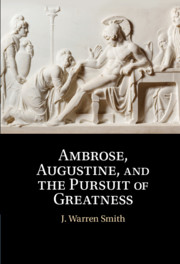Book contents
- Ambrose, Augustine, and the Pursuit of Greatness
- Ambrose, Augustine, and the Pursuit of Greatness
- Copyright page
- Dedication
- Contents
- Acknowledgments
- Abbreviations
- Introduction
- Part I The Problem of Greatness and the Great-Souled Man from Plato to Plutarch
- 1 Greatness of Soul
- 2 The Roman Ideal of Great-Souled Men
- Part II Ambrose’s Great-Souled Christians
- Part III Augustine and the Magnus Animus
- Epilogue
- Bibliography
- Index
2 - The Roman Ideal of Great-Souled Men
from Part I - The Problem of Greatness and the Great-Souled Man from Plato to Plutarch
Published online by Cambridge University Press: 24 November 2020
- Ambrose, Augustine, and the Pursuit of Greatness
- Ambrose, Augustine, and the Pursuit of Greatness
- Copyright page
- Dedication
- Contents
- Acknowledgments
- Abbreviations
- Introduction
- Part I The Problem of Greatness and the Great-Souled Man from Plato to Plutarch
- 1 Greatness of Soul
- 2 The Roman Ideal of Great-Souled Men
- Part II Ambrose’s Great-Souled Christians
- Part III Augustine and the Magnus Animus
- Epilogue
- Bibliography
- Index
Summary
Writing in retirement from public life during the civil war between Julius Caesar and Pompey the Great (49–44 BC), Marcus Tullius Cicero was witness to the destructive consequences of ambition among Romans that Plato had feared in ambitious Greeks such as Alcibiades.1 Drawing on elements of the Greek philosophical tradition, Cicero proposed a diagnosis of the sickness that infected the Roman body politic and led to civil upheaval, and out of this assessment, he crafted a conception of greatness and of the great-souled man that tempered Rome’s love of martial glory while retaining an authentically Roman regard for political competition. Instead, therefore, of abandoning the idea of the great-souled man or making it a purely pejorative term as did Plato, Cicero in his De Officiis adapted a Stoic form of μεγαλοψυχία from Panaetius of Rhodes to harness aristocratic ambition for the service of the res publica.2 Later generations of critics have varied in their assessment of De Officiis. Some have read it as the swan song of a narcissist whose love of his song’s beauty blinded him to the economic and political realities that led Rome to the civil war.3 Others have seen it as Cicero’s manifesto in preparation for his return to public life as leader of the Optimates who, together with the support of Octavianus, would liberate Rome from Antony’s tyranny.4 Still others, more sympathetically, read the philosophical writings between April and December of 44 BC as having existential as well as political significance. His diagnosis of the excessive love of glory as the cause of the civil war was cathartic for Cicero – a reckoning with the flaws of the Republic he loved and idealized.5 Written to his son, Marcus, and young men of that generation, the De Officiis exhorts them to pursue that civic virtue and greatness to which the truly great-souled men should aspire. Using the structure of Panaetius’ argument and Roman exempla, De Officiis reimagines virtue and glory in terms of the statesman’s service in the civil context of the Senate house rather than martial greatness proven on the field of battle.6 The result is nothing less than a redefining of virtus, as the quality of the orator-statesman as well as the soldier. Cicero saw such greatness as one of the four sources of all honestas, together with knowledge (cognitio), a commitment to the common good (communitas), and moderation (moderatio) (Off.C. 1.43.152).
- Type
- Chapter
- Information
- Ambrose, Augustine, and the Pursuit of Greatness , pp. 68 - 104Publisher: Cambridge University PressPrint publication year: 2020



